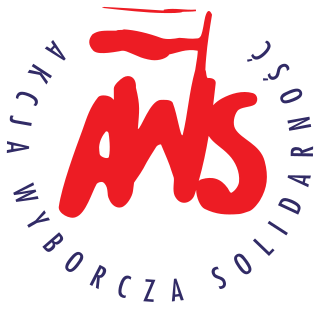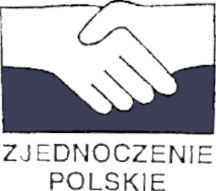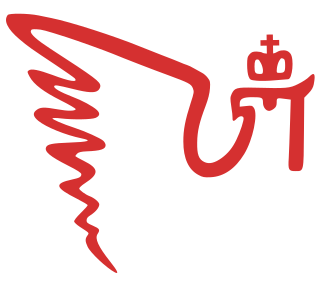Related Research Articles
The Civic Platform is a centre-right liberal conservative political party in Poland. Since 2021, it has been led by Donald Tusk, who previously led it from 2003 to 2014 and was President of the European Council from 2014 to 2019.

Solidarity Electoral Action was a coalition of political parties in Poland, active from 1996 to 2001. AWS was the political arm of the Solidarity trade union, whose leader Lech Wałęsa, was President of Poland from 1990 to 1995, and the successor of the parties emerged from the fragmentation of the Solidarity Citizens' Committee.

The Conservative People's Party was a liberal-conservative and Christian-democratic political party in Poland, which was active in 1997–2003 and 2007–2014. In 2014, the party was incorporated into Poland Together.

The Nonpartisan Bloc for Support of Reforms was an officially nonpartisan organization affiliated with Lech Wałęsa. The party was established in 1993, and became part of Solidarity Electoral Action in 1997.

The Citizens' Movement for Democratic Action was a political faction in Poland coalescing several members of the Solidarity Citizens' Committee.

The Centre Agreement was a Christian-democratic political party in Poland. It was established in 1990 and had its roots in the Solidarity trade union and its political arm, the Solidarity Citizens' Committee. Its main leader was Jarosław Kaczyński. The party was initially the party of choice of Polish president Lech Wałęsa and heavily cooperated with him and his environment between 1990 and 1992, leading the first post-communist governments. In 1991, Jan Olszewski from Centre Agreement gained the support of Wałęsa for his candidacy for Prime Minister, forming a PC-led government. However, the government was mired with internal conflicts in 1992 and fell to a vote of no confidence. Afterwards, the party was increasingly marginalized and became a part of Solidarity Electoral Action in 1997. In 1999, the bigger faction of the party left to the newly created Polish Christian Democratic Agreement; further, in 2001, the leadership of the party dissolved Centre Agreement to found Law and Justice, the direct successor of the party. However, it wouldn't be until a year later that it would dissolve.

National Party of Retirees and Pensioners is a minor left-wing political party in Poland. The main goal of KPEiR is protecting retired seniors, pensioners and trust-busting. The current leader is former Sejm Member Tomasz Mamiński.

The Party of Regions was a left-wing Polish non-parliamentary political party created in November 2007 and registered in February 2008. The Party of Regions was created by former members of Self-Defence and the Democratic Left Alliance after the parliamentary election in 2007, when Self-Defence support collapsed to far less than the 5% electoral threshold giving them no seats in the new legislature. Founders of the grouping included Krzysztof Filipek, Danuta Hojarska and Bolesław Borysiuk. For failure to disclose their financial records for the year 2015, they were struck off in early 2017.

The Social Alliance was an electoral coalition created for the 1998 Polish local elections. Formed on 27 June 1998, the Social Alliance included the Polish People's Party along with its smaller left-oriented party partners, such as the Labour Union, the National Party of Retirees and Pensioners, the Self-Defence of the Republic of Poland and few members of Alliance of Democrats (Poland). The party represented the "independent left" that challenged the anti-communist and pro-communist dichotomy of Polish politics while maintaining a strongly leftist profile inspired by pre-WW2 socialist and agrarian movements. It protested against the capitalist reforms carried out in Poland such as austerity, criticizing them for creating massive wealth inequality. Nevertheless, the coalition cooperated with the post-communist Democratic Left Alliance as well as the Polish Socialist Party.

The Labour Party is a minor political party in Poland. It was formally called the Christian-Democratic Labour Party(Polish: Chrześcijańsko-Demokratyczne Stronnictwo Pracy, ChDSP) between 1989 and 2000. The party continued the traditions of the pre-war Labor Party, which ceased its activities in Poland in 1946. This made the party be considered a historical formation, together with the Polish Socialist Party.
The Civic Coalition is a catch-all political alliance currently ruling in Poland. The alliance was formed around Civic Platform in opposition to the then-ruling Law and Justice (PiS) party.
The Social Movement was a Christian-democratic political party in Poland.

The Movement for the Republic was a Christian-democratic political party in Poland. The party was founded by former members of centrist Centre Agreement who protested the downfall of Jan Olszewski and his cabinet from power. The party aspired to become the leading Christian-democratic party in Poland and contested the 1993 Polish parliamentary election, but it gained no seats as it failed to cross the 5% electoral threshold. The party was also mired by several splits and internal conflicts, which results in the party disintegrating into several smaller parties and formations. In 1995, Movement for Reconstruction of Poland founded by the party's first leader Jan Olszewski, absorbed most members of the party. The RdR dissolved in 1999.

The Polish Union, also known as the Regional Agreement RdR in 1993, was a Christian-democratic centre-right political party in Poland. The party was founded by defectors from Polish Christian-democratic party Movement for the Republic, who left the party over the dispute regarding forming a possible coalition with Centre Agreement, the party that Movement for the Republic was itself a split from. Shortly after being formed, the Polish Union announced an electoral union with the Centre Agreement in June 1993, known as Centre Agreement – Polish Union.

The Third Republic Movement was a minor conservative political party in Poland functioning between 1992 and 1995, when it united with the Movement for the Republic to form the Movement for the Reconstruction of Poland.
The Centre Agreement – Integrative Initiative was a Christian-democratic political party in Poland. It was founded by the former secretary and member of the executive board of Centre Agreement (PC) Wojciech Dobrzyński, who was stripped of his functions on 5 October 1994, and then expelled from the party by Jarosław Kaczyński in January 1995. Kaczyński expelled Dobrzyński over his willigness to cooperate with the right-wing Christian National Union, a party that wanted to create an All-Polish electoral alliance that would unite all right-leaning parties in Poland but exclude the PC.
The Movement for the Republic – Patriotic Camp was a political party in Poland. It was a party that split from the Movement for the Republic (RdR), with the split being caused by differences of opinion in regards to the party's position and possible cooperation with the President Lech Wałęsa. The RdR–OP was led by Romuald Szeremietiew who supported cooperation with the President, and was narrowly elected the leader of RdR in 1993. However, the party leadership annulled the results of the election, and elected Olszewski in the name of Szeremietiew, prompting the split. The party was a right-leaning movement and was strongly supportive of not only the President Lech Wałęsa, but also the efforts to form a united centre-right front against the post-communist left in Poland.
The Alternative Social Movement was coalition of Polish political parties formed on 18 March 2001 in Warsaw for the 2001 Polish parliamentary election. The grouping was formed from a merger of Confederation of Independent Poland - Patriotic Camp led by Michał Janiszewski, Tomasz Karwowski, and Janina Kraus, together with a group of politicians originating from the Christian National Union (ZChN), including Henryk Goryszewski and Mariusz Olszewski. The coalition was also joined by the Free Trade Union 'August 80' Confederation, led by Daniel Podrzycki and Bogusław Ziętek. The Alternative Social Movement was registered as a political party, and its members mainly became the activists of August 80.

The Homeland Patriotic Movement was a right-wing electoral coalition created for the 1998 Polish local elections. It was a coalition of numerous right-wing formations as well as an environmentalist party and left-wing trade unions, and sought to present a right-wing alternative to the centre-right Christian-democratic Solidarity Electoral Action. The founding parties of the coalition were a part of the Solidarity Electoral Action in the 1997 Polish parliamentary election, but left it over political and ideological disagreements. The main party in the coalition was the Nonpartisan Bloc for Support of Reforms, renamed to Bloc for Poland. Despite running an aggressive and dynamic campaign, the coalition finished 6th and won 3.19% of the popular vote, winning 256 council seats in total, including 2 out of 855 seats in the voivodeship sejmiks. The coalition dissolved shortly after the election, but its members continued their cooperation, founding the Alternative Social Movement for the 2001 Polish parliamentary election.
References
- 1 2 Borowik, Bogdan (2011). Partie Konserwatywne w Polsce 1989–2001. Wydawnictwo Uniwersytetu Marii Curie-Skłodowskiej. p. 124. ISBN 9788322731581.
- ↑ Krystyna Paszkiewicz (red.) (2004). Partie i koalicje polityczne III Rzeczypospolitej. Wydawnictwo Uniwersytetu Wrocławskiego. p. 65. ISBN 8322924933.
- ↑ Upper Silesian-Dąbrowa Basin Conservative-Liberal Group, a faction of the Liberal Democratic Congress